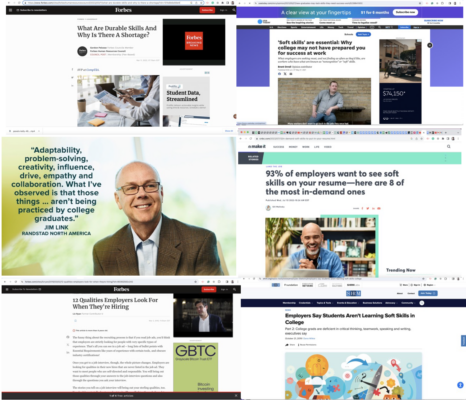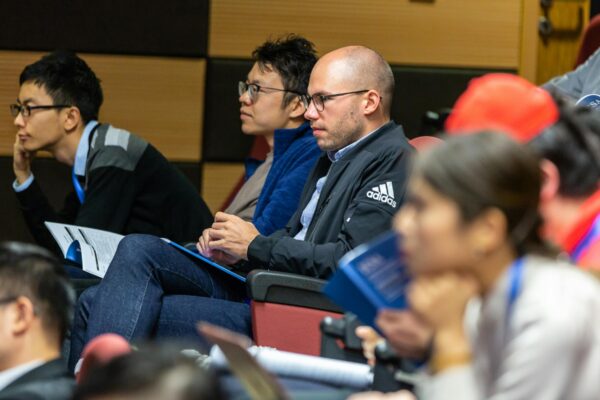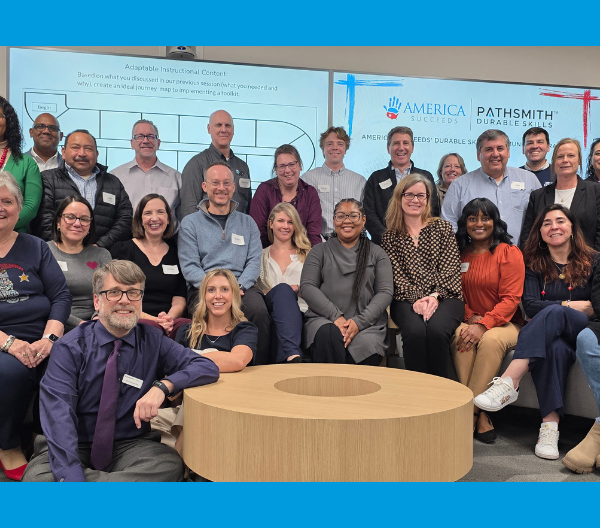Submitted By Todd Macadangdang
A seasoned EdTech leader with 20+ years of experience, Todd has consistently delivered innovative web-based solutions for students and educators alike. With a rich background at Adobe Systems and Simon and Schuster, Todd holds invaluable insights for thriving in the corporate world. Additionally, consulting for clients like Mattel, Disney, and National Geographic and leading a startup based in Norway, Todd understands what it takes to thrive in an innovation economy. Now, as lead durable skills Trainer and Program Director at MindSageAcademy.com, he shares his wealth of expertise to empower students for success in the workplace and life.
As education policy starts to emphasize durable skills for preparing students for work, there’s a growing need to understand how to kickstart this training. This series shares insights from seven years of developing and improving our durable skills approach.
If you’re here, you’ve probably dealt with the challenge of adding more to your teaching load and are interested in learning about bringing durable skills into your classroom. Let’s begin at the start.
A Successful Durable Skills Program: Starting Off on the Right Foot
KEY NUMBER ONE: For a durable skills program to succeed, both teachers and students must recognize, understand, acknowledge, and agree on the vital importance of developing durable skills for future success in the workplace.
It’s crucial for students to understand why developing professional-level durable skills is vital for their success in the workplace. For many subjects they are exposed to, students don’t see any practical relevance or usefulness. You may hear students say, “Why learn something I’d never use?”
In addition, for decades, they and their parents have been led to believe that academic performance alone guarantees success, based on grades, GPA, and standardized test scores. It has been our experience that most students don’t automatically recognize the significance of developing durable skills.
This also applies to teachers. Many teachers have been focused on doing whatever they can to help their students prepare for and pass standardized tests, possibly overlooking the importance or need for teaching durable skills.
But, for any durable skills program to succeed, teachers too must understand, appreciate and acknowledge the value of durable skills. In our innovation economy, professional durable skills training is the new higher ed.
ACTION ITEMS:
- Define durable skills for both teachers and students. In addition to the Durable Skills Advantage Framework, powered by America Succeeds, which provides a common language for discussing durable skills, we define durable skills as the traits, qualities, habits, mindsets, and attitudes highly sought after by employers. These skills enable individuals to perform at a high-level, irrespective of whether they possess a degree or not. This definition is much easier for both students and teachers to grasp than simply saying they are communication or leadership skills. So step one: define durable skills in a manner that is clear and tied to the importance they hold for employers as well as the student’s future employability and success.
- Next, prove it. We always start our eight week durable skills certification workshop by having students perform the simple task of googling information about ‘Soft skills’, a term which many companies still use as opposed to ‘durable skills’. We have them use search criteria such as:
- Are soft skills important in the workplace?
- Do employers want/look for soft skills?
- What are the most important soft skills?
Below are examples of what we want them to find on their own:
They may also find quotes from Human Resource firms and researchers:

“Courses and programmes that promote the development of soft skills are more likely to produce graduates more equipped to successfully enter the world of work. Research shows that 51% of Gen-Z’ers think that by 2050, a CEO will not need a college degree.” – The Adecco Group
An overwhelming majority ― 93% of employers ― say “soft skills play a critical role in their decision about whom they want to hire,” -ZipRecruiter, recent report The Job Market Outlook for Grads.
Research conducted by Harvard University, the Carnegie Foundation and Stanford Research Center has all concluded that 85% of job success comes from having well‐developed soft and people skills, and only 15% of job success comes from technical skills and knowledge (hard skills). – https://www.nationalsoftskills.org
While it’s not mandatory, we typically encourage the workshop group to share insights gained from their research on durable skills and their personal significance. This reinforces the importance of developing soft or durable skills. Again, it is vital for any successful durable skills program, students must understand just how crucial these skills are for obtaining, retaining, and excelling in a job and career. How important those skills are to employers.
As a teacher, in addition to your own Google search, we recommend that you also read America Succeeds’ report, The High-Demand for Durable Skills.
SUMMARY:
Both students and teachers must recognize the crucial role that developing durable skills plays in their future workplace success. They both need to appreciate the high value employers place on soft skills, understanding that in today’s innovation-driven economy, attributes like creative problem-solving, critical thinking, imagination, empathy, and collaboration are no longer optional but mandatory.
It’s not that our educational system is so inadequate; it simply hasn’t adjusted quickly enough to the times. Core subjects are still important, but in an innovation economy, durable skills must be incorporated into the new path to job preparedness.

Empowering Educators: Flexible Durable Skills Implementation for Enhanced and Effective Impact
KEY NUMBER TWO: It may seem counterintuitive, but it’s vital to work with teachers who grasp the significance of helping students develop durable skills, and are enthusiastic about integrating your program.
Surprisingly, mandating a program isn’t the magic formula. Our pilots confirmed that teachers who genuinely embraced the durable skills program achieved the best outcomes and witnessed tangible improvements in their students. Take, for instance, a teacher who had a seventh-grader approach them regarding a bullying incident. Typically, the student would’ve handled it one way, but thanks to the class lessons, they approached it differently, resulting in a positive resolution.
However, here’s the kicker: A single dissenting or disgruntled teacher can derail the entire effort. In one instance, a teacher’s reluctance to embrace the durable skills pilot undermined the program’s momentum at their school. Their persistent complaints about additional work and professional development dampened the enthusiasm of other teachers, leading to the pilot ending prematurely.
So, the takeaway? Keep the durable skills program optional rather than mandatory. That being said, all teachers should receive durable skills PD – and it’s important that it includes not only information on implementing the program but also how they can develop and enhance their own durable skills.
You may have the knee-jerk reaction of thinking that this isn’t fair to students in classes where teachers are not yet willing to implement durable skills training. What you’re feeling might be a holdover from the focus on standardization in education that began with the No Child Left Behind Act (NCLB) in 2002.
But in reality, the approach we’re suggesting is playing the long game. As teachers implementing the program share their positive experiences and notice changes within their students, including improved academic performance, those who initially had reservations or were against the initiative gradually become more supportive. Even if only some students receive durable skills training, it’s preferable to the program fizzling out entirely, leaving students in the future with absolutely zero access to such valuable training. Again, this insight isn’t just academic. We’ve seen it play out in real-time.
In addition, you already know that students feel they are forced to sit and learn subjects they are not interested in and will most likely have little practical day-to-day use once they leave school. Forcing students to endure yet another new program will be counterproductive. Help them understand just how much they will depend on durable skills for success in the future; then they’ll be ready to not just learn, but transform.
The nice thing about durable skills is that they are not an issue for most teachers, unlike SEL (social-emotional learning). SEL has become a politically hot topic for many, including parents and educators. On the other hand, there are very few educators we’ve met who felt that helping students develop durable skills that employers want was bad or related to political ideologies.
Even parents are usually positive about soft skills, or durable skills programs for their kids. If not, I’ll often ask parents with high school age students, “Would you hire your son (or daughter) as they are right now? If not, why?” Most often, the parent will list positive qualities, traits, mindsets, habits, or attitudes their child does not possess, or negative qualities, traits, mindsets, habits, and attitudes their child needs to get rid of. Parents usually make the point for me.
ACTION ITEM:
- Begin with initial Durable Skills professional development (PD) sessions for all teachers. Inform them that implementing the Durable Skills program is optional and that you only require their attendance for four 30-40 minute sessions. Even the most skeptical teachers are more likely to participate in PD if they know there’s a set limit. Identify teachers who show enthusiasm for implementing the durable skills program before, during, or after all the PD sessions are completed. We’ve found that some teachers who are initially skeptical, see the value over the course of the initial PD. Invite those identified to be part of the first phase of implementation and assure them of ongoing support for integrating Durable Skills into their classrooms from the program provider.
SUMMARY:
PD sessions should stress to teachers that employers are actively seeking graduates with durable skills, and it’s employers who are urging the need to develop these skills in students. Moreover, it’s crucial to convey to all teachers that education extends beyond academics for students to thrive in the workplace. The PD should also incorporate hands-on lessons to assist teachers in cultivating specific durable skills.
Also, it’s extremely important to provide the background and context of the program you choose to implement. For instance, we inform teachers that our program was developed over five years ago in the workplace, and has already demonstrated its effectiveness in the real world. It’s not just academic. In addition, it wasn’t developed in a vacuum. We highlight that as an Edtech studio we work with a network of teachers and administrators to get constant feedback. So, the program was created by professionals but refined by educators.
During the PD sessions, the goal is to build confidence in whatever durable skills program you choose to implement. Reassure teachers that they and their students not being treated as guinea pigs. You want them to feel that they’re participating in a program that’s been tested and proven effective, rather than diving into something experimental. The objective for this general PD is to help boost all teacher’s confidence and interest in participating.
Finally, consider offering professional durable skills training as an option or elective for students. Make sure all students research ‘soft skills’ or ‘soft skills and employers’ and share what they learn with the class. You’ve probably seen your son or daughter learn something on their own just by watching YouTube tutorials. Just imagine if your students had that same enthusiasm for developing durable skills. Feel free to reach out if you’d like more ideas on helping students recognize the importance of developing soft or durable skills.
Again, based on our experience, some students will cling to the belief that getting into a good college is the only path to success, due to societal and cultural influences they’ve been exposed to since they were kids. For instance, there was a student who did homework during our team meetings. When I reminded everyone that our meetings were for work, she simply turned off her video instead of engaging. It was clear that she didn’t benefit as much from our durable skills training program as students who understood the importance of going beyond academics. So try not to worry that not every student will receive durable skills training if it is optional. Instead, focus on helping all students appreciate how much employers value durable skills and how they are essential for success in the workplace and life.


Do you want to share your Durable Skills work in action? Submit this form to have your work featured on our blog!




